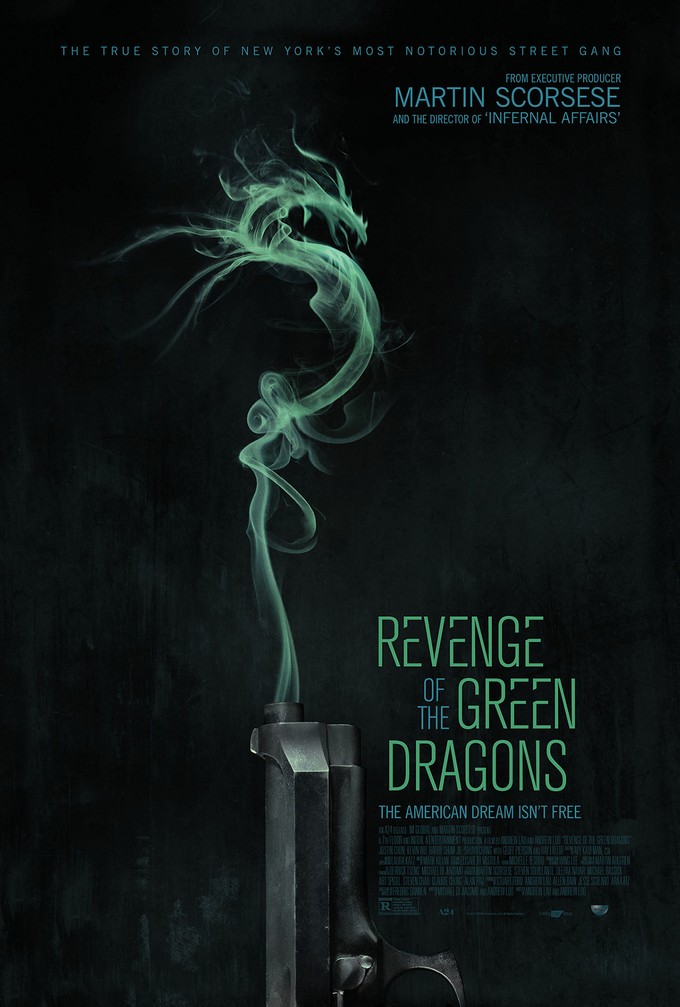
The world of Chinese-American gangsters is a notoriously inscrutable one for outsiders. Films like YEAR OF THE DRAGON and THE CORRUPTOR have shown the society through the eyes of white cops, but it remains largely unexplored on film, particularly when compared to the usually-nearby Italian mob (in NYC, Little Italy cuts directly into Chinatown). Veteran Hong Kong director Andrew Lau (INFERNAL AFFAIRS, INITIAL D) and his co-director and longtime associate Andrew Loo (IT HAD TO BE YOU!) have taken a look at the Chinese gangs running around downtown Manhattan and Queens in the 1980s in REVENGE OF THE GREEN DRAGONS. With a cast headed up by Justin Chon (Jeff Chang from 21 AND OVER) and featuring Ray Liotta, and assisted by a driving score by Mark Kilian, Lau and Loo spin a traditional gangster tale of two friends, one a hothead and one more morally conflicted, as they enter the ranks of the Chinese gangsters that own the streets they live in.
I was able to talk with Lau and Loo about their film via a phone interview. Though there was a translator present, the HK-born Lau mostly allowed Loo to speak on his behalf, aside from one China-specific question at the end.
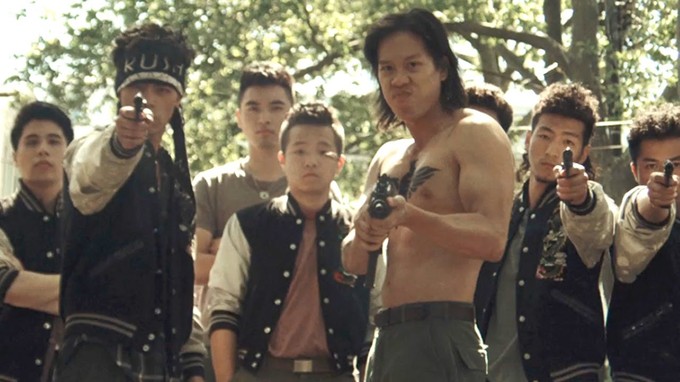
VINYARD: Mr. Loo, my first question is for you. The script was co-written by you and Michael Di Jiacomo. Who was the one who came up with the idea to adapt Fredric Dannen's (New Yorker) article? Was it you or was it Mr. Di Jiacomo?
LOO: The idea to adapt the article was inherently connected to a pitch that came from a pair of New York producers. They came to the other Andrew and myself and said, "Hey, we got the rights to this article that Fredric Dannen wrote, and if you want to take a look at it, we think it might make an interesting film." So they sent it over, and it was a very dense and richly populated world, and we were immediately taken with it. Our challenge was to take that rich material and turn it into a 90-minute story.
VINYARD: So the financing came through said producers, or did it come from an outside source?
LOO: The financing came from UFO Films out of Hong Kong. They put up a big chunk, then IM Global came in and put the rest down.
VINYARD: When did Mr. Lau come onboard?
LOO: We were onboard together, from the beginning.
VINYARD: What was it like working together as co-directors?
LOO: We've known each other for a while, more than 15 years. I produced some projects of his that came to the states, that were shot in English. We were on a picture called THE FLOCK in 2007. That was about the time I was starting to write my own stuff and direct. So there was already a creative, collaborative relationship at that stage. After THE FLOCK, we decided to open our own company and really focus on developing and controlling some of our own material. GREEN DRAGONS was one of the projects that came out of that initial initiative.
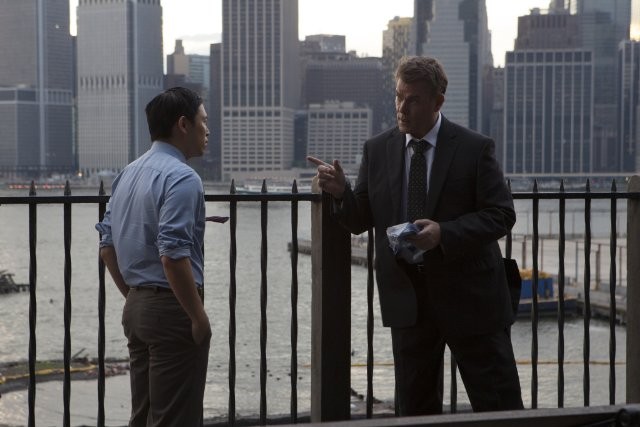
VINYARD: At one point did (executive producer) Martin Scorsese get involved?
LOO: It was pretty early on, certainly before the financing. We didn't have the typical indie film financing setup, we're not really financing off of the sellability of Brad Pitt or a marquee name, so the names that they really used to cobble together the financing was Lau's name and Martin's name.
VINYARD: Was Scorsese the one who got Ray Liotta? How did you guys land Ray Liotta?
LOO: Ray was recommended to us by Avy Kaufman, who was our casting director. She's done a lot of stuff with James Cameron. She had a whole list for us, and there were a lot of exciting names on there, and Ray was one of them. It just seemed like a really elegant and natural fit, obviously with the Scorsese connection and with Ray being available, so we really pushed hard for him. IM Global, when they got on the film, really tried to close that deal, and luckily they did.
VINYARD: Your three leads are played with actors with comedic backgrounds. A couple of them are on Youtube, I know Harry Shum Jr. was on GLEE, Justin Chon was in 21 AND OVER. Were you looking specifically for comic actors, or was that just kind of how it came about?
LOO: I don't think we had a mandate to look at the comedic community to populate our film. I think it was more the reality of when you're trying to cast an Asian film with dramatic leads. A lot of these actors that are based in the States, they don't have a huge body of work to support their acting ability. They're just stuck doing those kind of roles for the most part, right? If you're talking about films shot in the U.S. in the English language, particularly studio films, I think a lot of times the Asian characters tend to be comedic relief or maybe the exotic girlfriend. We didn't set out to go that way, that's just how it ended up happening.
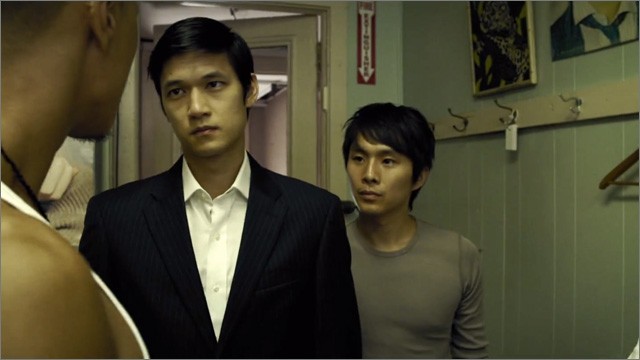
VINYARD: Can you talk a little about the differences between shooting in Hong Kong and shooting in New York City? I guess you were shooting in Chinatown and Flushing, and those areas can get pretty crowded. Were there any difficulties with the practicalities of shooting there?
LOO: New York is it's own sort of ball of issues, just like any other place, depending on where you go. There's always something to be concerned about. New York is an incredibly noisy place to shoot. We were also doing a period aspect, so Chinatown/Flushing today doesn't look like the Chinatown or the Flushing of the 1980s, when the story takes place. It required a little bit of work on our part. We had to scout locations for a huge chunk of time, we really had to employ a very conscious, but budget-minded approach to how to maintain a period look with what we were doing. Obviously, we didn't have the resources to go out there and build streets or businesses from the period, so our approach was a little bit more reductive. Removing signs, removing cars, removing…hydrants, and parking meters, things that really sort of clashed with the period.
VINYARD: Did mentioning Martin Scorsese's name at all help you with the New York authorities?
LOO: I think certainly it didn't hurt. (laughs) But most of the film ended up being shot in the Asian community, so actually, the real value on that was mentioning Lau's name. There were a lot of people who stepped forward, and it became something of a community effort. People lent their restaurants, or their apartments, or holding areas. With both of those names driving things, there was absolutely a tremendous level of cooperation.
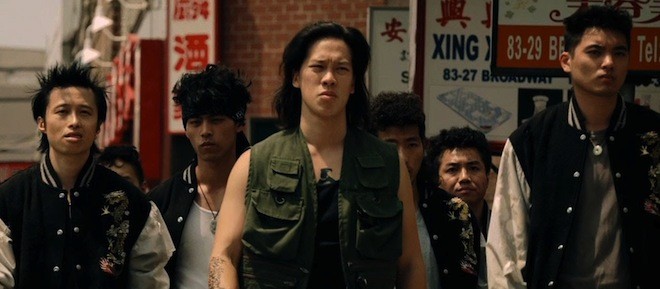
VINYARD: Can you talk about the score? The score by Mark Kilian has a really cool, kinda gritty feel. A lot of the film is told in montage, and the score really sets the tempo for the movie just as much as the editing itself. What direction did you give Kilian to get the score that you wanted?
LOO: He's from South Africa. He's an incredibly lovely person. One of the things Lau said from the very beginning, when we were going through the rewrites and making sure we got the tone right, was "Always remember, it's a man's world. Even though it's populated by a lot of kids, it's a man's world." So that was basically the mandate we gave to Mark. We wanted music that had a real bite to it, a real edge. We didn't want to go…for example, one of the obvious ways that you're gonna do period music from the '80s is to do that sort of sappy pop-rock, or whatever. That's clearly not hte direction we wanted to go in. He has a rock-and-roll background himself, and he brought on some incredible session musicians. He brought in Josh Freese, who used to do percussion with Nine Inch Nails. He brought in Tom Morello from Rage Against The Machine to do the end titles track. These guys rocked, they just rocked the house! We were pretty psyched about that.
VINYARD: Yeah, it's a great score. Beyond reading the original article, how much research did you guys do into the gang scene in Chinatown and Flushing in the '80s, and today, for that matter?
LOO: I mean, we feel like we did a lot. It took two-and-a-half years to get the script right. There was lot of interviews, and pouring over thousands of pages of transcripts, and meeting some of the surviving gang members. I spent some time with the elite detectives. There was quite a bit of research involved, but we didn't feel like we were making a documntary about the Green Dragons. We always felt it was important, at the end of the day, to be able to say that we found the truth of the story about the gangs and the way they lived, and that was something we payed close attention to.
VINYARD: What do you think was the biggest deviation you guys made from the real-life story?
LOO: The connection between Sonny and Tina, that wasn't true to life. Tina was part of the gang, as was Sonny, but there wasn't a romantic connection. Also, the real Sonny…is alive. I met him. I sat with him, and we talked for three hours. He was always going to be the sort of core of our film, but we took a little license, obviously, in the film with the whole Sonny thread. I think those are the biggest.
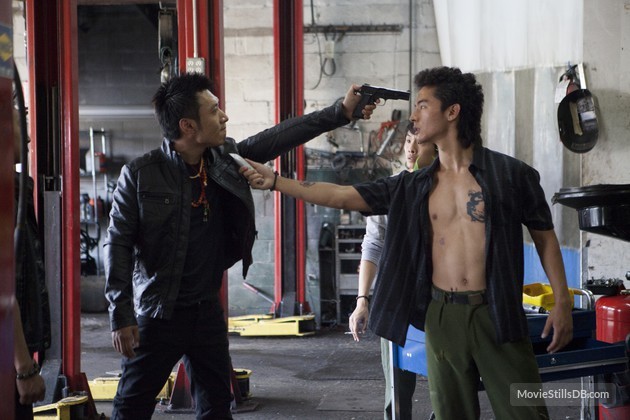
VINYARD: Could you just tell me some of the specific differences you've noticed between the youth gangs in New York, specifically Flushing and Chinatown, versus those in Hong Kong?
LOO: Now, or then?
VINYARD: First, can you talk about the differences between now and then in New York?
LOO: We're not from New York, we don't live there, but what our research tells us is that it was a completely different world in the '80s and '90s. There were certainly more immigrants. New York was pre-Ed Koch, it was a much more violent and crime-ridden place than it is today, right?
VINYARD: Absolutely.
LOO: It was a whole different world. The other component here, which no one could've anticipated in the '80s, was that China has become a dominant economic force in the world today. There was this sort of drive and impetus for communities to be emptied out during that period from China, and people coming to the States for economic opportunity. That dynamic no longer exists. If anything it's just the opposite, right? A lot of the research we had related to people in Chinatown and Flushing today who've recently come over who are working the kitchen and who are the delivery boys. A lot of these guys would give anything to go back!
VINYARD: (laughs) Sure. What were the differences you noticed between the gangs of Chinese kids currently in New York versus Hong Kong? (Mr. Lau entered the conversation at this point)
LAU: I think it's different, of course. I've made a lot of Hong Kong gangster movies. I know a lot of Hong Kong gangsters, but I don't know New York gangsters. I know many ex-gangsters. But everywhere's the same. Chinese society is one way, but Hong Kong gangsters have a different gangster-specific society. Even in New York, I think it's the same. They are separate. Some gangsters are from China, some gangsters are from Hong Kong. So many Hong Kong gangsters have their roots in New York. You ask what's different, what's different is that the Hong Kong gangster (scene) is more detailed. There's the head, then under the head there's some assistant head to control the fiefdom. You can say the difference is that the HK gangster is more organized. New York gangster is old-fashioned.
REVENGE OF THE GREEN DRAGONS is currently available on DirecTV On Demand, and will be playing theatrically in New York (at the City Cinemas Village East) and L.A. (at the Laemmle Noho 7) starting tomorrow.
